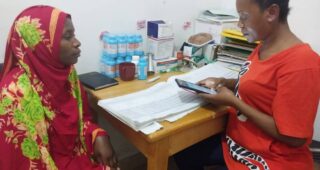Well-Being Helpers
I am very happy with both assisting the healthcare providers to improve the viral load coverage and contributing to the maintenance of the well-being of my peers… Chantal Ehadi Etumesako, Community Blood Collector
“My name is Chantal Ehadi Etumesako. I am both a mentor mother and a community blood collector at the Kingasani Hospital and Maternity Center.”
Chantal is a woman living with HIV trained as a peer counselor and mentor. Her lived experience enables her to connect with clients living with HIV in a unique and personal way. The hospital was struggling with clients missing their appointments for viral load testing, so the Kingasani Hospital and Maternity Center established a new approach to sample collection whereby community workers like Chantal visit clients who struggle to come to the facility at their homes and collect the samples there.
“Myself and four others were selected by this health facility staff to serve as community blood collectors for the purpose of supporting the viral load testing efforts,” Chantal says.
Viral load testing is essential to effective HIV care and treatment, as it gives the person and their healthcare providers evidence of whether or not their treatment plan is working. If a person’s viral load spikes, this usually means that either the medication is ineffective or there are barriers at home to consistent treatment, such as stigma, disclosure concerns, or food and housing insecurity. Either way, these results help link a person to the care they need, be that a doctor to transition them to a new treatment plan, or peer counseling and social services to address environmental stressors.
“One day, I had self-esteem after receiving a phone call from a patient who asked me to go to her home for viral load blood collection since she was not able to come to the facility because she had broken her leg,” she says.
“The monthly performance dashboard of blood collection within community is between 26 and 100 samples. As an example, we collected 82 blood samples from [people] at their homes during last March,” says Chantal.
To launch the program, the hospital identified candidates such as Chantal to perform community blood collection. The candidates underwent a one-month training session on sample collection techniques followed by a one-month practice session, where staff performed blood draws under the supervision of their trainers. The team acquired tools such as alcohol, gloves, syringes, lancets, torniquets, aprons, and refrigerated boxes, and under the supervision of nurses, Chantal and her peers began collecting in the community. Eventually the team is qualified to work alone, reducing strain on human resources and enabling Chantal to have provide personal and private support independently.
The contribution of community blood collectors is valuable since it has improved the viral load coverage, which is now 89% of expected patients during this reporting quarter. The coverage rate is improved in comparison with the previous quarters. Dr. Claude Mwamba, EGPAF/IHAP-Kinshasa Project Officer for the Kingasani Hospital
“I am very happy with both assisting the healthcare providers to improve the viral load coverage and contributing to the maintenance of the well-being of my peers (people living with HIV) who were not available to reach out to the health facility on days of their viral load blood collection appointments for various reasons,” says Chantal.
Jean-Robert Ntsukunyu
Democratic Republic of Congo
Community Mobilization; Strengthening Local Capacity



